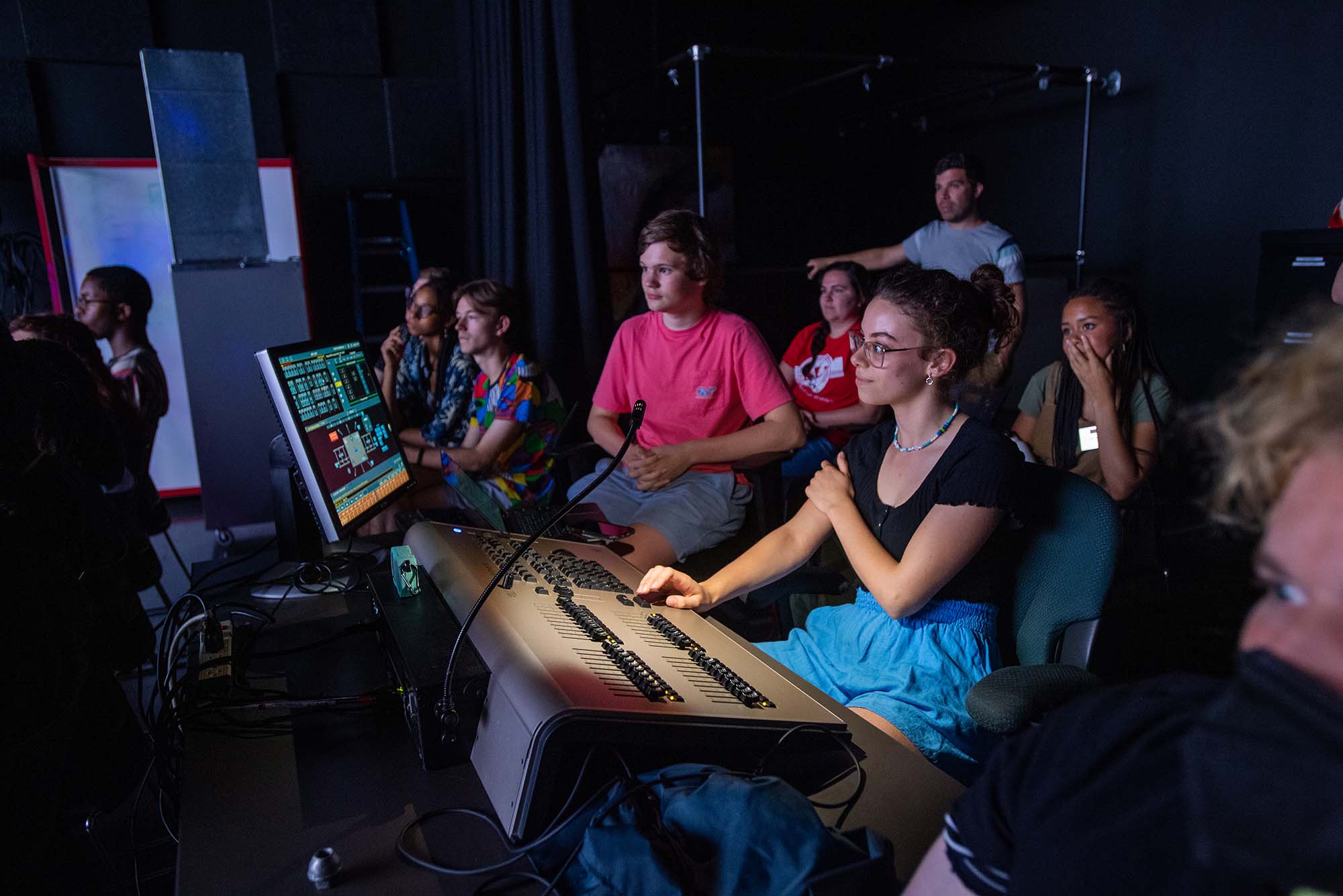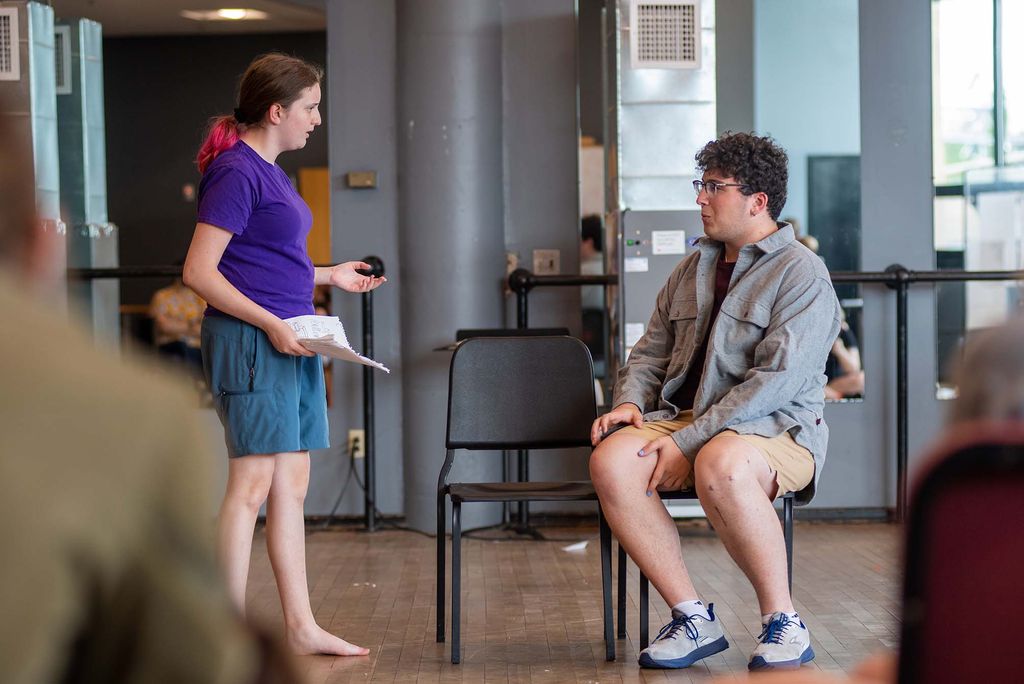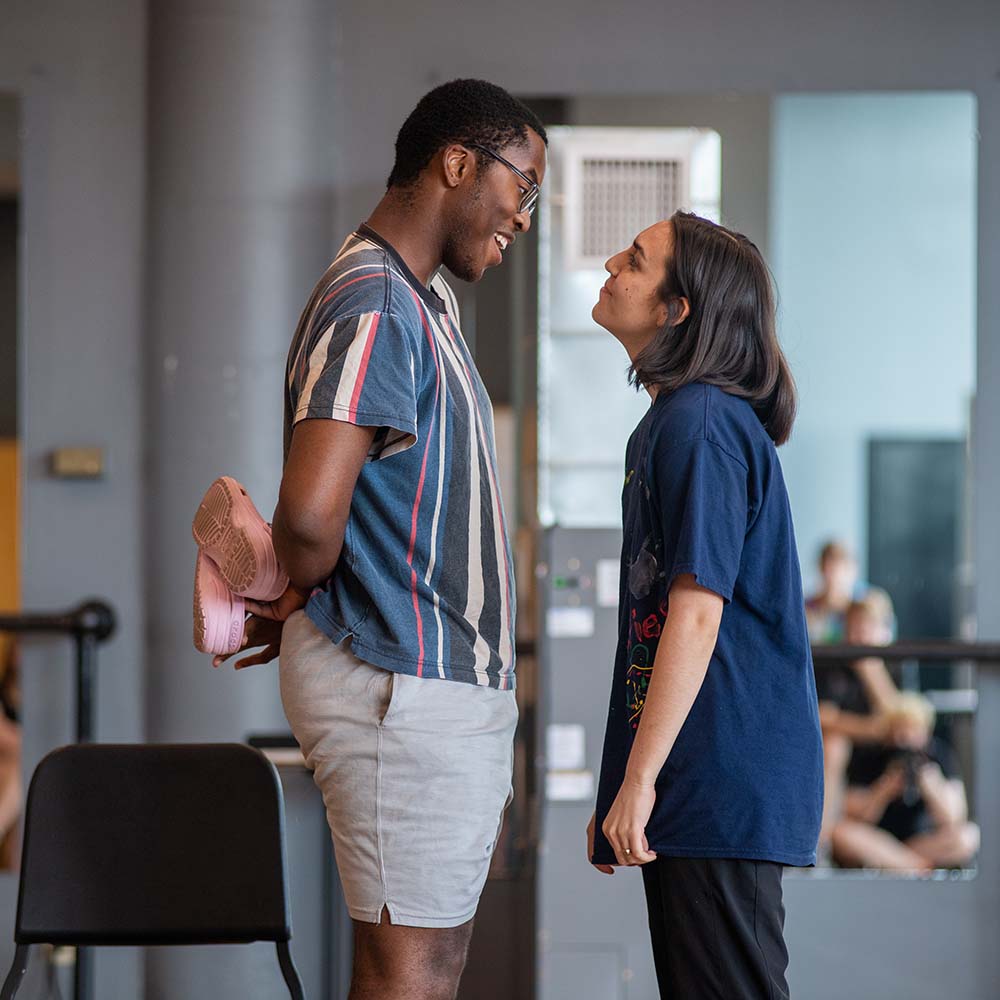CFA Summer Program Gives High Schoolers an Intro to College-Level Theater
BU Summer Theatre Institute seeks to foster “not just well-rounded artists, but well-rounded human beings”

Nora Kempner (center) a 17-year-old high school student from Medway, Mass., who is enrolled in the BU Summer Theatre Institute’s design program, shares her lighting scene design with classmates.
CFA Summer Program Gives High Schoolers an Intro to College-Level Theater
BU Summer Theatre Institute seeks to foster “not just well-rounded artists, but well-rounded human beings”
This article originally published in BU Today, August 3, 2022. By Sophie Yarin.
Sixteen high school students stand waiting, straight-backed, in rows of four. The music queues up as the first row springs into motion. Their task is to physically bring the word “dab” to life. The second row follows, then the third and the fourth, with each young actor darting and flicking their bodies across the floor.
Across the hall, another group of high schoolers sit in a circle, planning a small scene. They’ve been assigned the creation of a theatrical moment symbolizing a social issue that affects them. They block out the moment in tandem.
Their notes are pasted on the wall behind them:
“ISSUES IN THE WORLD:Misuse of social media.
FUTURE YOU IMAGINE:Abolishment of TikTok/other social media.
Rihanna drops a new album.”
The students have come to Boston from across the country to take part in the BU Summer Theatre Institute (BUSTI), an intensive five-week program for high schoolers that allows them to pursue their interests in a professional environment. Now in its 41st year, BUSTI is designed to give young people a taste of the conservatory experience, combining classwork with theater workshops and the opportunity to create and perform an original piece. The first block of the day is devoted to two classes: movement and Theatre for Social Change. In the afternoon, students attend their elective tracks—design and acting—and take workshops, and in the evening, they break into three groups to rehearse ensemble pieces. The grueling schedule—13-hour days, Monday to Saturday—is just one aspect of the college theater experience the program seeks to emulate, says Emily Ranii (CFA’13), BUSTI academic program head.
“Many of our students are away from home for the first time,” she says. “They’re navigating meals on their own in the dining halls, they’re navigating what it’s like to live in the dormitories, and they’re exploring the city of Boston when they’re not in classes.”

Kate Dickinson (left) and Walker Reiss, both 16, perform a scene during a BU Summer Theatre Institute (BUSTI) acting class.

At right, Joshua Asuru (left), a 17-year-old high school student from Alabama, and Sofia Olona, a 17-year-old from California, perform a scene during a BUSTI acting class.
Many of the students say BUSTI is nothing like their high school theater experiences.
“I go to a fine arts school and this is still so much more intense,” says Nora McElroy, who traveled from Texas to attend this year’s program.
“I never realized how much work it is,” adds Finn Wiegand from Belmont, Mass.
For many of the participants, BUSTI also represents the first time they’ve had a chance to create original works. The final performances of the summer are all written, directed, and designed exclusively by the students.“It’s very different from my high school theater program, because we have the ability to create what we want here,” says Langston Fantroy, who is from Illinois. “We have more artistic control over what we’re putting out on stage.”
BUSTI’s focus on creating “devised theater”–the collaborative process of developing original, theatrical material–does more than challenge students’ creativity, says Ranii; it teaches them how to collaborate and discover themselves as parts of a whole.
“[Devised theater] really explodes a student’s idea of what theater is and what theater does,” she says. “The artists are not concerned with, ‘I only do my work in this specific design area.’ They’re thinking more holistically about, ‘What does the project need, and what ideas can I offer?’”

BUSTI students Ariel Phillips (left) and Colin McCabe perform a scene during an acting class.
BUSTI seeks to provide its students with an opportunity to take part in different areas of theatermaking, says instructor Deen Rawlins-Harris.
“I think a beautiful thing about this program is that they’re receiving information from so many different instructors,” says Rawlins-Harris, who is teaching this year’s Theatre for Social Change class. “Everything that they do in movement class could come into this class, everything that they do in their ensembles can come into this class.”
Ranii says one of the goals of the program is to help students become “not just well-rounded theater artists, but well-rounded human beings.”
“Our measure of success is not that a student goes off and becomes a theater artist,” says Ranii, who also serves as artistic director of BU’s Wheelock Family Theatre. “It’s beautiful and wonderful if they do, but it’s more that theater skills are life skills and it means more that a student finds their voice, learns how to collaborate with other human beings, and finds their passion.”